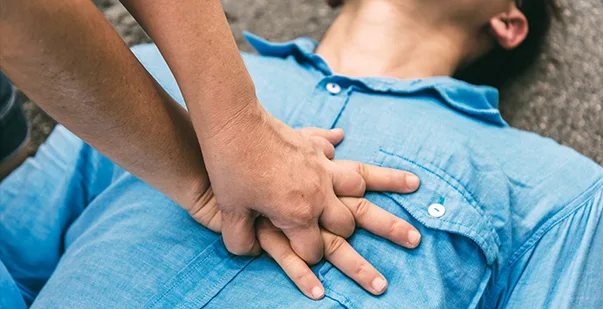
Last Updated on: October 16, 2024
Table of Content
Sudden cardiac arrest can strike anytime, without warning. Statistics have shown that about 350,000 cardiac arrests occur outside of the hospital each year in the United States alone. When bystanders perform CPR until emergency services arrive, survival rates can increase multifolds. This shows how important first aid certification is for anyone.
Being CPR-certified saves lives and gives one confidence when situations require it. So, let’s explore what’s CPR certificate is, the top reasons why first aid certification is important, and how you can get this important certification.
First aid certification provides lifesaving skills and helps you know your limitations in CPR technique. A school can have a large number of students; hence, it needs to have individuals adequately prepared for an emergency. Learning CPR allows them to act calmly under pressure in whatever emergency may come.
Moreover, the significance of first aid certification for students exceeds the mere ability to act promptly in case of an emergency. Hence, it contributes to making schools a safer place and reduces the chances of miserable outcomes from accidents.
First aid education instills responsibility among students and encourages a caring attitude in schools. In addition, high school students who are interested in such fields have an added advantage in securing a job. This is why first aid certification is important.
Read More: Why Is First Aid Important In Our Daily Lives?
Heart and respiratory disease emergencies are on the rise throughout the globe. This is mainly due to the fact that people have shifted towards unhealthy lifestyles and ignore their health while working. As a result, anybody can face such emergencies at any place.
In such a situation, a responder equipped with CPR and AED skills can be a great asset. Here are the top 10 reasons why first aid certification is important for students as well as for everyone else:
Knowledge of the emergency cardiac care certification technique can help you handle emergencies efficiently. Certification in CPR would be helpful since it enhances survival chances among cardiac arrest victims by maintaining blood flow to the brain and heart.
CPR training gives people confidence during emergencies. This sense of empowerment helps them handle emergency situations more effectively. It reduces the amount of fear and trepidation associated with high-pressure situations.
Early CPR can substantially enhance cardiac arrest patients’ results. Early action can restore the heart’s normal rhythm until help from professionals arrives. That is why first aid certification is required for all, as it prepares people to take immediate steps.
Many workplaces use their employees’ CPR certification. This provides a safer environment for all and can reduce the effects of workplace accidents. It would be most valuable in a risky setting like a construction site or a large office setting.
Often, first aid training is included in CPR training. This can be very valuable in recognizing common injuries and medical ailments someone sustains and knowing general care for them. Knowledge of such skills can help boost overall personal safety and preparedness.
Family members, including your children, may experience in-home medical emergencies. CPR training allows you to be prepared and handle such eventualities with surety. As a matter of fact, the possession of such skills would assure you and all your loved ones of preparedness in advance.
Most professions, especially those in healthcare and education, require or prefer individuals with CPR certifications. Certification could make prospective employment candidates more attractive to employers, as it is evidence of regard for safety and preparedness.
As guidelines change periodically, CPR certification must be periodically recertified. Periodic updates ensure that this set of skills is always relevant and effective. This type of periodic training offers a way to uphold high standards in emergency care.
Read More: Adult CPR: How to Give CPR to an Adult
Getting CPR certified could be the best decision one makes to serve society and oneself. The certification process is relatively simple and involves a few key steps. Following are the steps on how to become CPR certified:
The first thing you want to do to become CPR certified is to research accredited organizations that offer courses in CPR and first aid. You will find these through hospitals, community centers, or online resources.
Once you’ve decided on a type of course that suits your needs, most organizations will also offer several options for CPR training, from basic to advanced levels. Many different classes are available online and on-site.
Check the length of the course, content, and instructor credentials. You will study very important skills throughout the course, including chest compressions, rescue breaths, and the use of an AED device. This will help you understand what you do in a CPR class to sharpen your techniques on mannequins and participate in some simulated scenarios.
After the training, you must undertake and pass both the written exam and the practical skill test. The latter covers all the procedures concerning CPR and emergency responses, while the former reviews how well you can conduct CPR in a simulated type of emergency.
After passing, you will obtain your certification in CPR, which is valid for two years. You would then have to renew the same periodically to update yourself with the latest recommendations and skills in CPR.
When you are skilled at dealing with cardiac or respiratory emergencies, you can save a precious life with your quick and effective actions. That is why first aid certification is important. With an understanding of how to get CPR certified and the importance of certification in Emergency Cardiac Care, you will be prepared to make a difference when situations demand it.
Whether it’s for personal confidence, career enhancement, or community safety, the benefits of getting CPR certified are endless. So don’t wait any longer. Take the next step today to get your certification in CPR so that when it counts, you will be prepared to act.